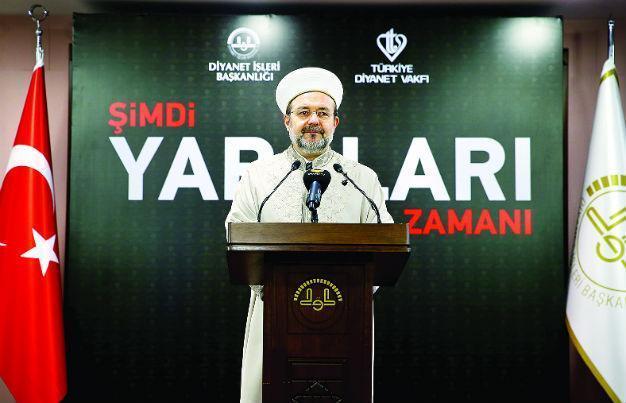Top cleric delivers Friday sermon in Mardin
Meltem Özgenç - MARDİN/ANKARA

AA photo
Turkey’s top cleric has personally delivered this week’s Friday sermon in the southeastern province of Mardin on the same day as Prime Minister Ahmet Davutoğlu paid a visit to the city in order to announce a much-anticipated plan to restore the country’s southeast where an ongoing conflict has raged between security forces and militants of the outlawed Kurdistan Workers’ Party (PKK).
Mehmet Görmez, the president of the Directorate General of Religious Affairs (Diyanet), delivered a Friday sermon in Mardin’s Grand Mosque where Davutoğlu also performed his Friday prayer.
“Our nation is running to heal wounds of all victims of the world. Bombs rained on Gaza, you went to heal their wounds. When I personally visited [Gaza] to repair their mosques, I have seen this plate on those temples lying in ruins as saying ‘Invaders devour it, but Turkey comes and repairs it’ and my eyes filled with tears when I saw it,” Görmez said at the sermon Feb. 5.
“Hunger and famine occurred in Africa and this nation mobilized for recovering Somalia,” he said. “They had siblings in Arakan who were oppressed and they healed their wounds.”
Ahead of his visit to Mardin, Görmez held a meeting in Ankara with all provincial and district muftis serving in the southeast region, with the conflict between security forces and the PKK being a top agenda item. The muftis complained of the PKK’s activities targeting their staff and logistical sources, while they also said that the PKK have been employing “so-called imams” who were not actually employed by the Diyanet.
Görmez decided to meet preachers and muezzins in addition to muftis in the region during his visit to Mardin on Feb. 5. He has planned to diversify religious services to the region’s people by drafting a “roadmap” and an “urgent action plan in the aftermath of terrorist activities.”
The Diyanet drafts a weekly sermon delivered at the nation’s 85,000 mosques, which it supervises, and more than 2,000 mosques abroad that function under the directorate. It also employs all of Turkey’s imams, who are technically considered civil servants trained by the state.
